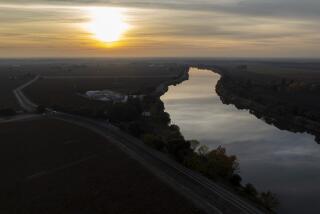For English Channel Tunnel, a Small Step Toward Reality
- Share via
LONDON — After 183 years and numerous false starts, the idea of constructing a fixed link across the English Channel between Britain and France moved a step toward reality Thursday as seven organizations submitted formal proposals on the project.
The British and French governments have said they will study the proposals for three months before reaching a decision on how to proceed.
The proposals include a variety of combinations of highway, railway, tunnel and bridge to span the channel from a point near Dover on the British side to a point near the French port of Calais, a distance of 22 miles. Cost projections range from $3 billion to $8 billion.
Travel time would be cut significantly, from an hour at best on the ferries currently in service to about 30 minutes, but the cost of crossing would be roughly the same as it is by ferry.
If a go-ahead is given, the “chunnel” project could be completed by the early 1990s, according to timetables submitted with the bids.
First by Napoleon
Over the years, there have been many plans to build a tunnel under the channel. The idea appears to have been mentioned first by Napoleon Bonaparte, in 1802.
Several factors seem to favor the present effort. Unlike most previous schemes, it calls for complete private-sector financing, removing a major political stumbling block that caused earlier plans to be set aside. It was chiefly on economic grounds that Britain canceled the last tunnel project, in 1975.
With Britain and France both suffering from high unemployment and both governments under pressure to deal more effectively with the problem, the channel project is attractive because it promises thousands of jobs, some of them permanent.
One of the proposals regarded as being among the front-runners--a road carried by tunnel and bridge with a separate rail tunnel--would create up to 50,000 jobs in Britain and another 50,000 in France for the duration of the project, its sponsors say.
Bridges Out 7 Miles
They represent a consortium that includes the British Steel Corp., the Trafalgar House conglomerate and Societe Generale, a French bank. They propose to build bridges reaching out seven miles from each coast that would link up with a tunnel passing under the channel’s busy shipping lanes. Much of the construction would consist of prefabricated steel components that could be produced in areas of high unemployment.
Another proposal said to be high on the list of contenders is that of an Anglo-French group that includes Credit Lyonnais, the National Westminster Bank and several large British and French construction companies. It calls for twin rail tunnels that would accommodate high-speed passenger and vehicle trains.
Both governments insisted that all bids contain specific proposals for protecting the link against possible terrorist attacks. The British also insisted that they contain provisions for preventing the spread of rabies into Britain, one of the few areas of the world completely free of the disease.
‘Indecent Haste’
Residents along the British coast near the proposed terminus have joined cross-channel ferry operators in opposing the fixed link. The member of Parliament for the district, Jonathan Aitken, accused the governments of “indecent haste” for agreeing to consider the schemes without first conducting a full-scale public inquiry.
But an official at Britain’s Ministry of Transport said there has been no haste, adding: “I would hardly describe nearly 200 years of discussion as haste. Perhaps it is finally time to get down to the job.”
More to Read
Sign up for Essential California
The most important California stories and recommendations in your inbox every morning.
You may occasionally receive promotional content from the Los Angeles Times.










